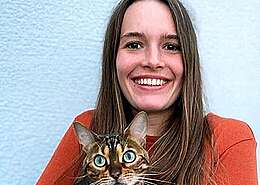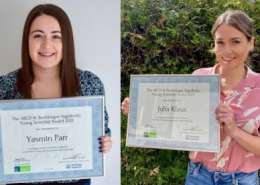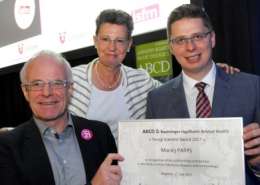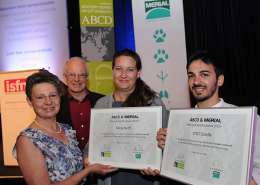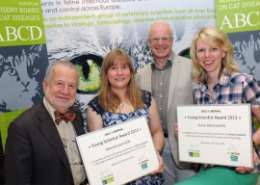2015 Young Scientist Award Winners Paweł Bęczkowski and Emily Porter

Paweł Bęczkowski: BETTER UNDERSTANDING FIV INFECTION
The 2015 AMYSA for Basic Research was presented to Dr Pawel Beczkowski (31), a Polish resident in internal medicine (ECVIM) at the Small Animal Hospital at the University of Glasgow, UK.
While studying at the University’s Centre for Virus Research, he focused on virus evolution in the disease progression of natural feline immunodeficiency virus (FIV).
Relatively little is known about this process in naturally infected cats: why do some infected cats remain healthy while others rapidly progress to immunodeficiency? Dr Bêczkowski found this may be due to the relative stability of the FIV env gene.
“His work may help contribute to a better understanding of FIV infection, commented Dr Karin Moestl, chair of the European Advisory Board on Cats Diseases (ABCD). “This work is not only of veterinary significance and of clinical relevance, but also of comparative significance, as FIV serves as a valuable model for HIV infection.”
Emily Porter: FCOV GENOTYPES AND THE DEVELOPMENT OF FIP
The 2015 AMYSA for Clinical research went to Dr Emily Porter (27) of Bristol University, for her work on the relationship between FCoV genotypes and the development of FIP. Feline coronavirus infection (FIP) is one of most common causes of infectious disease in young cats housed in multicat environments.
However, only a small percentage of infected cats go on to develop disease signs associated with FIP. Sequencing of the complete genomes of pathogenic and non-pathogenic viruses allowed identifying differences in the viruses that may contribute to pathogenicity.
“Emily Porter’s work contributes to the identification of virus mutations relating to the development of FIP”, commented Dr Jean-Christophe Thibault, Merial’s Technical Director for Biologicals (Europe, Middle East and Africa).
“It also opens the door to the development of a robust reverse genetics system, contributing to the development of new diagnostic tools and to the construction of genetically modified recombinant viruses as candidate vaccine strains”.
ABCD & Merial Young Scientist Awards
The 2015 AMYSA for Basic Research was presented to Dr Pawel Beczkowski (31), a Polish resident in internal medicine (ECVIM) at the Small Animal Hospital at the University of Glasgow, UK.
While studying at the University’s Centre for Virus Research, he focused on virus evolution in the disease progression of natural feline immunodeficiency virus (FIV).
Relatively little is known about this process in naturally infected cats: why do some infected cats remain healthy while others rapidly progress to immunodeficiency? Dr Bêczkowski found this may be due to the relative stability of the FIV env gene.
“His work may help contribute to a better understanding of FIV infection, commented Dr Karin Moestl, chair of the European Advisory Board on Cats Diseases (ABCD). “This work is not only of veterinary significance and of clinical relevance, but also of comparative significance, as FIV serves as a valuable model for HIV infection.”
The ABCD and Merial Young Scientist Award, created in 2008, is funded by Merial and is presented to a young scientist in veterinary or biomedical sciences, who has made an original contribution in the field of feline infectious diseases and/or immunology. Applicants should have published their findings in a journal listed in PubMed or Web of Science or have had them accepted by another recognised assessing body.
Candidates should be based in Europe, have completed a veterinary or biomedical curriculum, and be under 35 years of age at the time of application. Applications in the fields of both basic and applied sciences are welcome.

July 2013 – ABCD & Merial Young Scientist Award winners Emily Porter (second left) and Pawel Beczkowski (centre) flanked by Jean-Christophe Thibault (Merial, at left), Karin Moestl (ABCD chair) and Claire Bessant (iCatCare, on the right)
